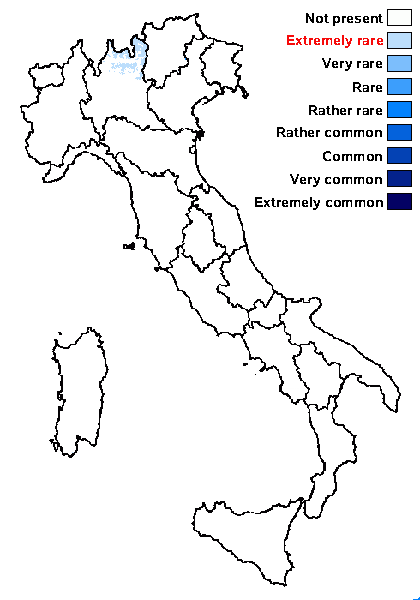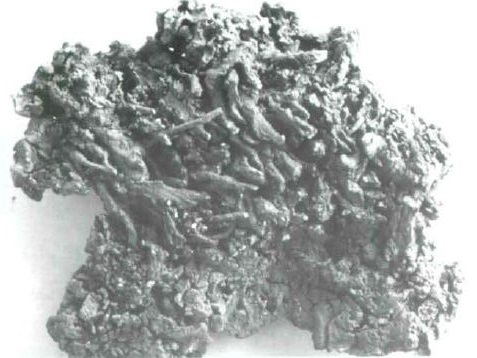Neocatapyrenium radicescens (Nyl.) Breuss
Ann. naturhist. Mus. Wien, 98B: 40, 1996. Basionym: Verrucaria radicescens Nyl. - Bull. Soc. Bot. France, 10: 267, 1863.
Synonyms: Catapyrenium radicescens (Nyl.) Breuss; Dermatocarpon pachylepis (Anzi) Zahlbr.; Endocarpon pachylepis Anzi
Distribution: N - Lomb.
Description: Thallus squamulose, of contiguous to overlapping, 2-5 mm wide, sinuous to sublobate, grey-brown squamules forming flattened to slightly convex, up to 4 cm wide pillows. Lower surface black, paler at margins, without rhizohyphae, attached by up to 1.5 mm thick and up to 20 mm long, simple or sparingly branched, black rhizines. Upper cortex paraplectenchymatous, 40-60 µm thick, of 5-8 µm wide cells; medulla white, prosoplectenchymatous, up to 300 µm thick; lower cortex clearly delimited from the medulla, with rounded to angular cells. Perithecia black, pyriform, up to 0.4 mm across, immersed in the squamules, without involucrellum. Exciple up to 40 µm thick, with a pigmented outer layer and a colourless inner layer; hamathecium of periphyses measuring 40-50 x 2-3 µm, interascal filaments absent. Asci 8-spored, clavate, the wall I-, with biseriately arranged spores. Ascospores 1-celled, hyaline, broadly ellipsoid, 14-18 x 9-10.5 µm. Pycnidia laminal, immersed in the squamules, up to 400 µm wide, rounded to cerebriform, Endocarpon-type. Conidia cylindrical, 7-11 x 1-1.5 µm. Photobiont chlorococcoid. Spot tests: cortex and medulla K-, C-, KC-, P-, UV-. Chemistry: without lichen substances.Note: on more or less fissured siliceous rocks near or above treeline; hitherto known only from southern France, Italy and Switzerland.
Growth form: Squamulose
Substrata: rocks, soil, terricolous mosses, and plant debris
Photobiont: green algae other than Trentepohlia
Reproductive strategy: mainly sexual
Commonnes-rarity: (info)
Alpine belt: extremely rare
Subalpine belt: extremely rare
Oromediterranean belt: absent
Montane belt: absent
Submediterranean belt: absent
Padanian area: absent
Humid submediterranean belt: absent
Humid mediterranean belt: absent
Dry mediterranean belt: absent

Predictive model
Growth form: Squamulose
Substrata: rocks, soil, terricolous mosses, and plant debris
Photobiont: green algae other than Trentepohlia
Reproductive strategy: mainly sexual
Commonnes-rarity: (info)
Alpine belt: extremely rare
Subalpine belt: extremely rare
Oromediterranean belt: absent
Montane belt: absent
Submediterranean belt: absent
Padanian area: absent
Humid submediterranean belt: absent
Humid mediterranean belt: absent
Dry mediterranean belt: absent

Predictive model
 INDEX FUNGORUM
INDEX FUNGORUM
 GBIF
GBIF


